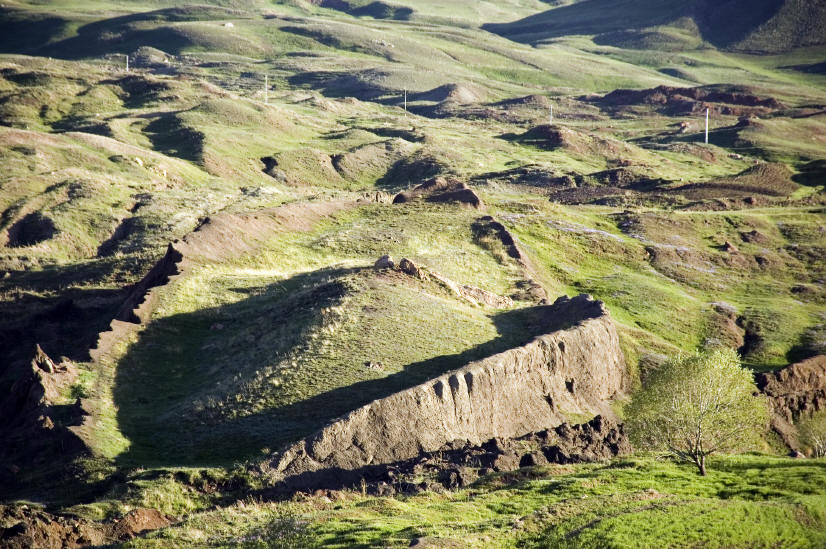
Above: View from rear, with pointed bow in distance.
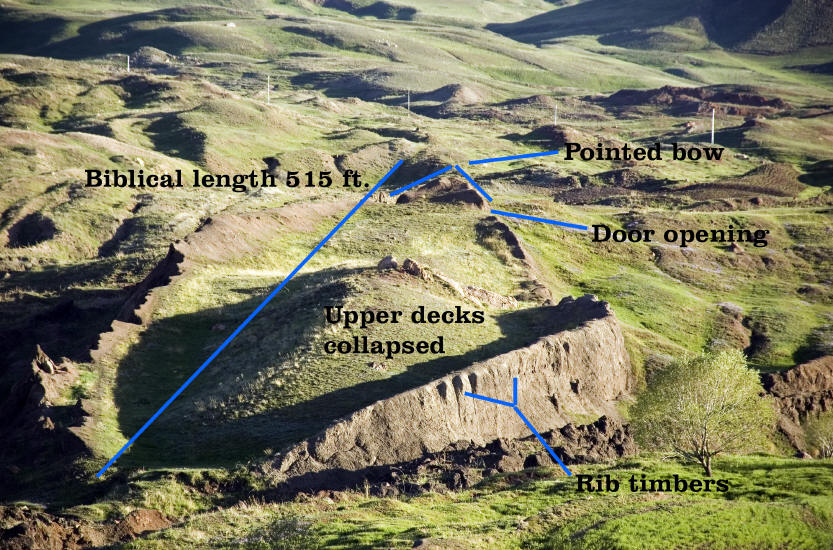
Above: Ark with features labeled
Friends, please
prayerfully consider the evidence you will see on Noah's Ark. It may
not be important or necessary for you to learn of this discovery, but there are
millions of people who need confirmation of biblical artifacts in order to
strengthen their faith in God and the Bible. Satan is strongly attacking this and other
discoveries in order to deceive men of God's truth. All the false stories
about finding Noah's ark were created by Satan to "muddy the water,"
and cause disbelief in the genuine.
|
The Real Noah's Ark!
Top Points to Consider
|
Above: 35 minute video from 4 hour DVD, Revealing God's
Treasure
The Biblical Location
There is only one verse in the Bible which gives us a hint of
where we the ark came to rest, "the ark rested...upon the mountains of
Ararat." Genesis 8:4. Where is Ararat? The name
Ararat is a large area or ancient country covering eastern Turkey, western Iran
and western Russia, as shown in yellow below.
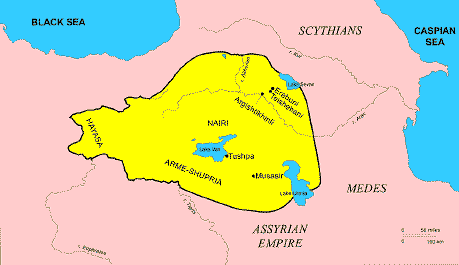
"The name Ararat, as it appears in the Bible, is
the Hebrew equivalent of ...Urartu, ancient country of southwest
Asia...mentioned in Assyrian sources from the early 13th century BC"
Encyclopaedia Britanica 15th ed. Some have mistakenly assumed the Bible
meant the
ark came to rest on Mount Ararat (Agri Dagh), but that is not the case. Mount Ararat is 17,000
feet tall, and is a post-Flood
volcanic mountain that gained its height after the Flood, therefore
there is no reason to assume it is a more likely candidate for the resting place
of the ark, instead it is a less likely candidate. The ark came
to rest in the mountains of the ancient country of Urartu, not on Mt.
Ararat.
The Ancient Historical Record
Flavius Josephus, c. 90 AD, the famous Jewish historian stated,
"Its remains are shown there by the inhabitants to this day."
He quotes Berosus the Chaldean, c. 290 BC, who indicated tourists would take
home pieces of the ark for making good-luck charms, "It is said there is
still some part of this ship in Armenia, at the mountain of the Cordyaeans; and
that some people carry off pieces of the bitumen, which they take away, and use
chiefly as amulets for the averting of mischiefs." These comments
tend to indicate its location would not be in an inaccessible area. At
some point, the ark was covered by a mud and lava flow which caused future
generations to lose its location.
Life Magazine 1960
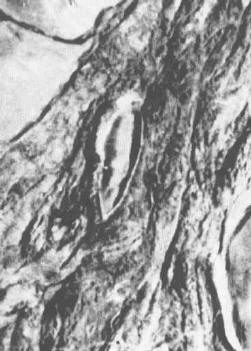
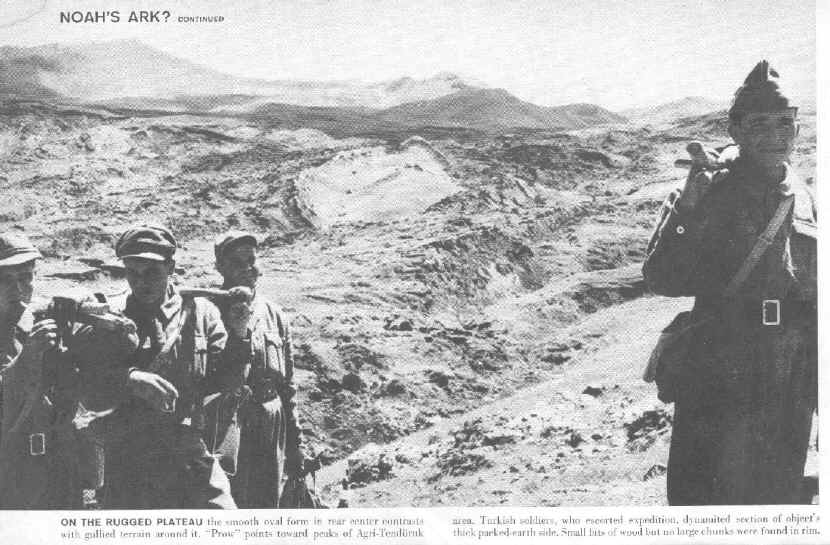
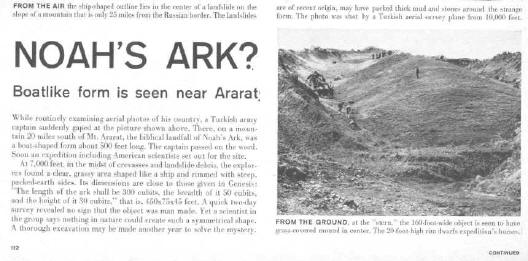
The 1960 expedition to the ark found a
formation whose
top sides were even with ground level as seen in the photos above. The
site researched by Ron Wyatt is 18.2 miles south of Mount
Ararat at the elevation of 6,524 ft., in the "mountains of
Ararat." A Turkish captain, Llhan Durupinar, was reviewing
NATO Geodetic Survey photographs of the area in 1959, and noticed a boat shaped
formation. Others in the U.S. then analyzed the photograph including Dr.
Arthur J. Brandenburger, world famous expert in photogrammetry, who said "I
have no doubt at all that this object is a ship. In my entire career I
have never seen an object like this on a stereo photo. Even the
approximate length of the object fits" The Ark File,
p118. An expedition sponsored by a party from the U.S. included among
others, Rene Noorbergen, later author of The Ark File; and George
Vandeman, evangelist, and Dr. Brandenburger. They made a visual inspection
of the site and conducted no scientific studies, only some digging and
dynamiting of the ark and and mistakenly concluded this site was just an
"odd geological formation." The expedition was expecting to find
on the surface of the ark "petrified beams" The Ark File,
p126, by digging in a few places. An article then appeared in the September 5th, 1960, Life
magazine, shown above, revealing a very impressive aerial photo of an extremely large boat-shaped object,
plus two photos taken by the expedition. Seventeen years later in 1977, Mr.
Wyatt made his first of 24 trips to the ark, and he was impressed that this
really was the remains of Noah's Ark! In the research he performed
over the next 15 years, Mr. Wyatt successfully performed metal detection tests
and subsurface
radar scans of the site, and he proved this site really IS the mud-and-lava
covered remains of Noah's Ark!
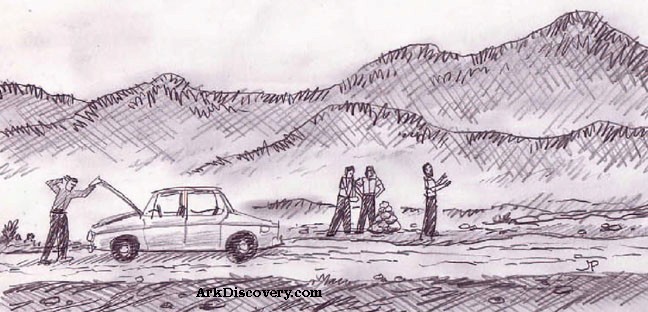
Above: Ron Wyatt in 1977 wanted to visit the area to
find the ark, but none of the 1960 group could tell him where it was located,
just some where near Mt. Ararat. Ron had three days in the area, so he and
his two sons prayed that the Lord would help them. They hired a taxi and
started driving around, then the taxi stalled. They were surprised, and
quickly piled up stones to mark the spot. The car then started and they
drove off. This happened three times. The next day Ron went back to
the piles of stones and walked out from them. He found the ark, the anchor
stones that you will see, and the remains of Noah's house. God had
performed miracles to partner with Ron in revealing this amazing discovery.
Government Confirmation:
Visitors' Center Opened
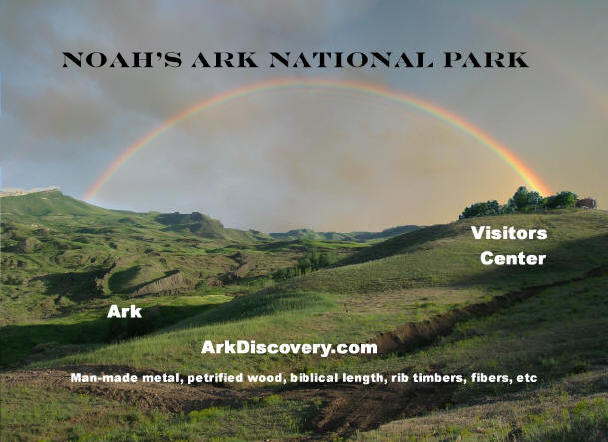
The Turkish government has double-verified Mr. Wyatt's
tests, and they have given him credit for the discovery.
The announcement appeared in Turkey's largest newspaper on June 21, 1987.
The area was first designated a National Park, and then it was upgraded
to the status of a National Treasure. The government has built a visitors'
center overlooking the site and issued official tourist brochures so people of all races can come and see the ark!
Above: Visitors' Center, overlooks the ark site which is to the
left. photo Kevin Fisher
Above: Inside the Visitors' Center at Noah's Ark National Park. 2009
|
|
The Announcement of the
Discovery
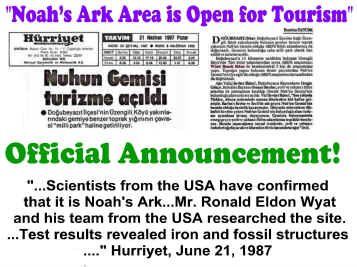
Translation of newspaper article announcing the discovery
of Noah's Ark:
"THE NOAH'S ARK OPENED TO TOURISM. The surrounding area of
a ship-like soil pile nearby the village of Uzengili within the township of
Dogubeyazit as a national park. Dogubeyazit - The American Academics
confirmed the soil pile nearby the village of Uzengili in the township of
Dogubeyazit is Noah's Ark. The surrounding area is declared to be a
national park and it is opened to tourism. 15 Km away from Dogubeyazit at
the village of Uzengili, Ronal Eldon Wyatt and his colleagues, an American
research group, made researches after their Turkish colleagues completed their
investigations. Upon analyzing the soil structure and finding specific
iron pieces and particles, the American researchers concluded that Noah's Ark is
located at Uzengili village. With a ceremony attended by the Governor of
Agri Province, Subgovernor of Dogubeyazit township, the Mayor Usha, Mr. Osman
Baydar and the local and foreign scientists and researchers and a group of
citizens, the Noah's Ark is opened to touristic visits. The Governor
Serket Ekinci said, "In recent years, Turkey has become one of the countries to
be visited in worldwide tourism. It is assured that the Noah's Ark,
mentioned in Quran and the Bible, is located here. I am honored to pen
this area having the Noah's Ark which attracts attentions of millions in the
world. I owe our thanks to those national and foreign scientists and
researchers contributed to the researches so as to locate Noah's Ark. At
the social facilities to be built, we will accommodate local and foreign
tourists and have our country make hard currency." translation
courtesy Val Smith
www.throneofgod.com
Government sign directs your
way to the ark
Kevin Fisher standing in the "Valley of Eight" along
the main highway, this government sign points your way to "Noah's Big Boat"
and away from the infamous Mt. Ararat.
The ark rests in the
direction of the sign, up on "Doomsday Mountain"
5 Km away, rests Noah's pride and joy.
5 Km away, rests Noah's pride and joy.
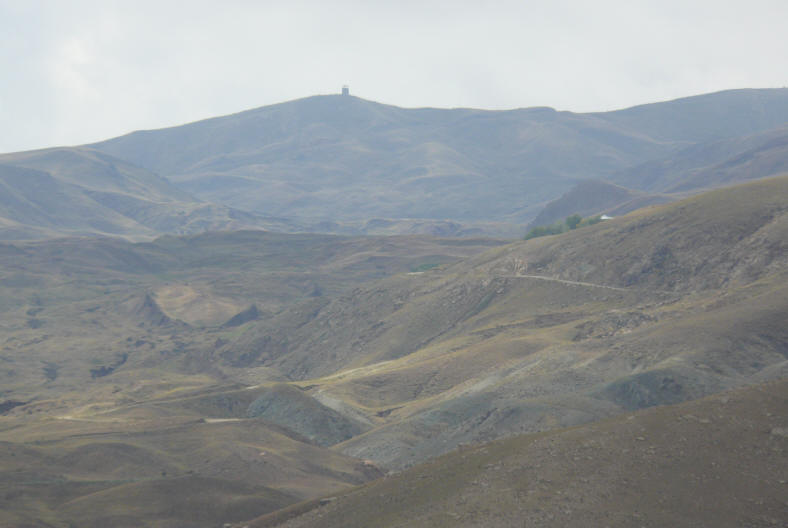
Above: Using our zoom lens from the road
in the valley, we can see the ark at left and the
visitors' center roof at right. In the distance is the Iranian guard tower. photo Kevin Fisher
visitors' center roof at right. In the distance is the Iranian guard tower. photo Kevin Fisher
The Length Matches the
Biblical Record!
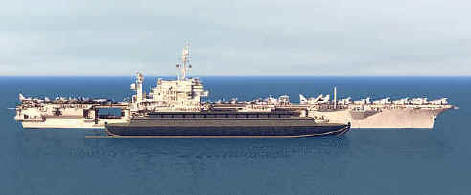
Noah's Ark at 515 feet compared to the U.S.S. Kitty Hawk aircraft
carrier. Graphics Mark Johnson
ArkFind.com
The length of the ruins of the ark is 515 ft., which is exactly 300
Egyptian cubits (20.6 inches)! Moses was schooled in Egypt and was not
familiar with the Hebrew cubit which was not even in existence when Moses wrote
Genesis. So the Egyptian cubit
was used by Moses when describing the measurements of the ark.

The brown material above represents the outline and shape of the
ark today. The Bible said there were three levels, and based upon the
present depth of the ark, it may have originally appeared as shown above.
(diagram courtesy anchorstone.com)
Ark Excavated by God

Pre-earthquake photo

Above: We can see how the earth has dropped around the
sides of the ark. photo Kevin Fisher
Metal Used in the Ark!
The ark contains a large amount of metal fittings which
were used
to secure the large timbers together. These two photos below
are from our October
2000, trip to the site. Notice how there was once two large rivet
fasteners, but now only one is left. A large metal plate was positioned
behind the rivets. I received a positive metal reading when passing the
metal detector over the rivets. We should not be surprised to find metal alloys used in
the ark, because Genesis 4:22 states,
"Tubal-Cain, an instructor of every craftsman in bronze and
iron." photos Kevin
Fisher
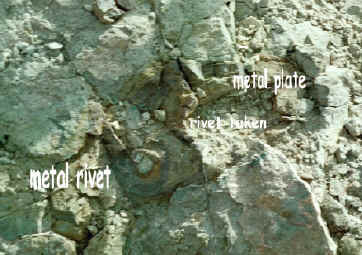
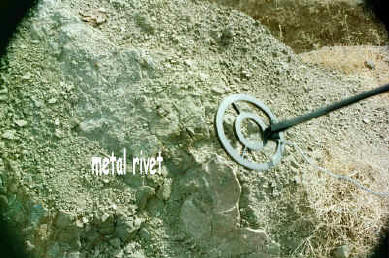
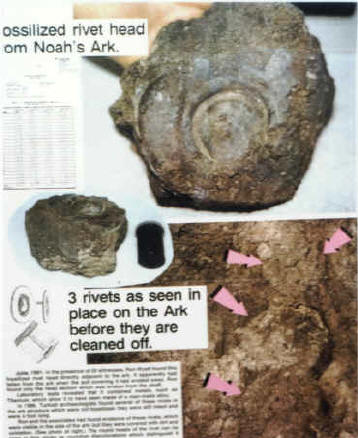
(Left) Ron Wyatt found a beautiful specimen of one of the metal rivets used on
the ark. It was tested and found to contain high-tech metal alloys, such
as titanium, magnesium, and aluminum, etc. Critics have said Ron did not
find this fine specimen on the ark but just manufactured it. Well, as you
will see below, we found the same objects and had them tested. They too
proved to have the same metals, in the same percentages! (Below) Two rough
rivets in lower portion of photo. photo Kevin
Fisher
Our Own Metal Samples Tested
Lab Report Shows
Rivet Contains Man-Made Metals!
Rivet Contains Man-Made Metals!
Below is what appears to be part of a large washer that would
have been slipped over a shaft and then secured on the shaft by flaring out the
end of the shaft. We have drawn
circles on the photo to demonstrate the circular effect in the specimen.
The surrounding material on the side of the ark around this object had a greenish color.
Assuming a circular shape, this sample would be the same size as the rivet found
by Mr. Wyatt. (The photo at right is of the rivet as we found it on the ark)
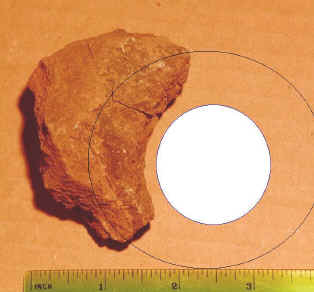
Galbraith Laboratories of Knoxville Tennessee has tested the specimen for three metals
I requested. I asked them to test for aluminum metal, iron metal, and
titanium metal. It costs $60 to test for each metal requested. The results show 8.35 %
iron metal, 8.35% aluminum metal, and 1.59% titanium metal. ALUMINUM AND
TITANIUM METALS ARE NOT FOUND IN NATURE!!! THIS OBJECT IS MAN-MADE, USING
ADVANCED TECHNOLOGY!! These results are similar to
those produced in the analysis of the rivet found by Mr. Wyatt. Since the
specimen is fossilized, it is assumed a large portion of it is now silica
replacement, reducing the percentage of metal that was originally in it when it
was made. These rivets are found in several locations on the outside of
the Ark, and are probably buried inside the Ark by the hundreds or
thousands. In comparison to others, this specimen is in poor condition.
The second item I had tested by the lab reveals that is is also
man-made. It was found on the side of the
ark. It produced positive metal readings with my metal detector when I
was at the site. Later in Istanbul, I tested it with a
magnet which produced an attraction to it. It appears to have been flared out (left
photo) by
pounding the center when it was hot. The left hand photo is facing us the way it appeared on the starboard side of the
Ark. Notice the side view (right view) which shows the tapering effect.
Test results from Galbraith Labs, completed in June 2001, reveal it has
man-made aluminum metal in it! It contains 8.08 percent aluminum metal, 8.24
percent iron metal, 1.34 percent titanium metal, and 3.82 percent magnesium
metal. Click on link below to read lab report.
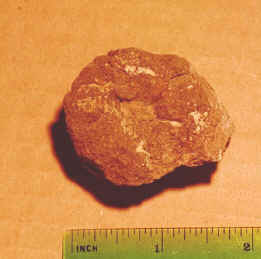
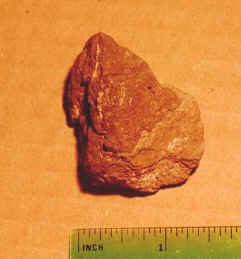
This may be the end of a metal rod. Turkish officials
reported removing four foot long metal rods from the site.
Metal Bracket
In May, 1985, Dr. John Baumgardner of Los Alomas Labs, was
inspecting the ark with a metal detector when he became startled and said, "Undecomposed
Iron!" A rectangular beam was protruding from the side of the ark, with
iron flakes. He found a beautiful right angled wrought iron bracket which
had been stretched and hammered, showing preferential gradiance. John
tested it at Los Alomas Labs and it was found to be 91.84% iron FE203.
Ballast?
Below is a suspected piece of
metal ballast that may have been thrown into the bottom of the ark when
the
craftsmen were through forming metal brackets and had metal waste left
over. Notice the concave features on almost every side, where other
pieces of ballast were pressed against it when it was still hot. I
found
this next to the ark. (Two photos of
same item.)
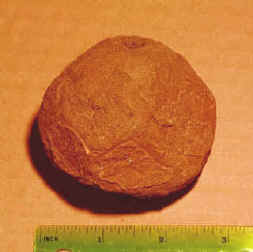
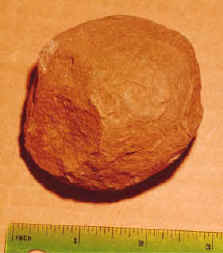
Metal Wedge?
This appears to be some manganese ballast which was poured
into the hull in a liquid state,
then hardened and took the curvature of the hull (right photo). It has a coating on the convex side, while the flat side appears to be metal. Found a few feet away from the ark.
then hardened and took the curvature of the hull (right photo). It has a coating on the convex side, while the flat side appears to be metal. Found a few feet away from the ark.
Ballast Found by Wyatt
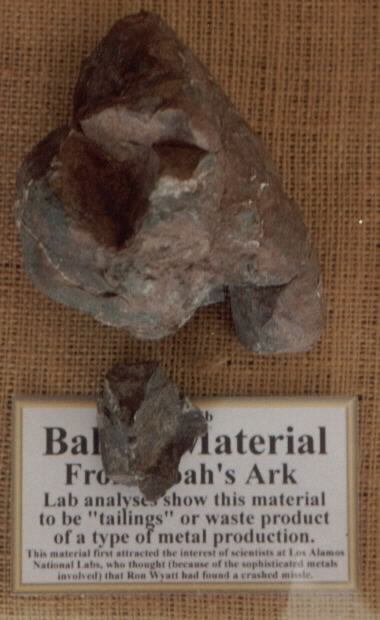
This is an example of the metal ballast that has been found in
the hull of the ark. It is made up of manganese primarily, which is a
by-product of forming magnesium that was used in the metal rivets. Found
by Ron Wyatt.
Square Object with "X" Impression
The western side of the ark had this square
object that had the appearance of metal on its top and three sides.. It also contained an impression
in it, much like it had been struck while it was hot. It was at a higher
level where I could not measure it. It may have been 8 inches in diameter.
photo Kevin Fisher
In London, Texas a metal hammer was found in
rock. This would be a pre-Flood, metal object:
http://184.154.224.5/~creatio1/index.php?option=com_content&task=view&id=26
http://184.154.224.5/~creatio1/index.php?option=com_content&task=view&id=26
Pre-Flood metal bell, found in West Virginia
coal:
http://www.genesispark.com/exhibits/evidence/paleontological/artifacts/bell/
http://www.genesispark.com/exhibits/evidence/paleontological/artifacts/bell/
Vertical Rib Timbers on the
Sides
Above: On the left are some of the vertical rib timbers
on the outside of the ark. photo Kevin Fisher
Above: A close-up shot of the petrified timbers, on
western, starboard side. photo Kevin Fisher
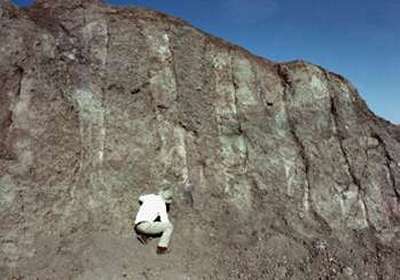
The port or eastern side of the ark, near the front, was scraped off by
Ron in an effort to view the timbers without loose, crumbling
material in the way. This process revealed the lighter color rib timbers
in a systematic, vertical pattern. You can see a darker, curved pattern
across the top, which represents the remnants of a large keelson.
(photo courtesy anchorstone.com)
Deck Posts
Above: Standing on the ark, we see the western, starboard, inside of the ark,
which
boasts these horizontal deck support posts extending above the matrix
material in the center and right portions of this photo. photo Kevin Fisher
boasts these horizontal deck support posts extending above the matrix
material in the center and right portions of this photo. photo Kevin Fisher
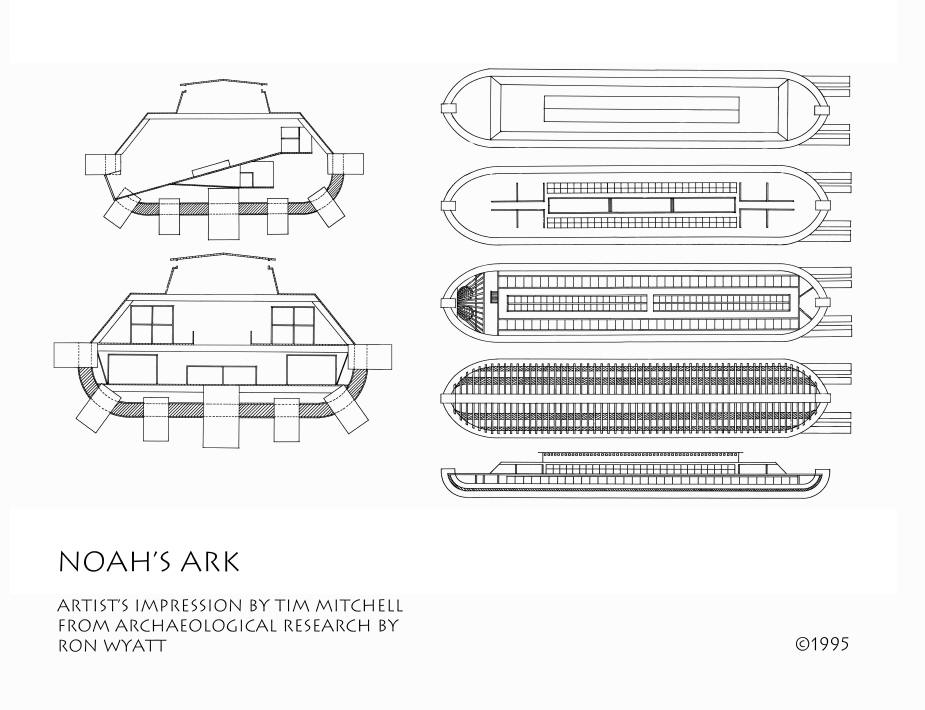
Above: Diagram of the ark based upon radar scans
Convex Symmetrical Deck
Above: The symmetrical shape of the ark
can been seen from the rear, with a center mound
that is the deck area that has collapsed, and the port and starboards side to the left and right.
A boy can be seen at the rear. photo Kevin Fisher
that is the deck area that has collapsed, and the port and starboards side to the left and right.
A boy can be seen at the rear. photo Kevin Fisher
The Petrified Wood
This example of the petrified wood shows distinct right angles
and the wood grain of the wood. Specimen found by Ron Wyatt.

A close-up photo of an 18 inch deck plank unearthed before Turkish officials by Ron Wyatt and features
three distinct layers of wood with glue protruding from the end. It was
tested and proved to be petrified wood. It is 18 inches in length and has
a few visible nails. It is made of three layers of wood with
dark pitch on top. At the bottom right you can see dark spots which may be
consistent with Pecky Cypress wood, so this may be the gopher wood described in the biblical account.
This deck timber was analyzed at Galbraith Labs in Knoxville, Tennessee, and was
found to have a total carbon content of 0.7100%. From this figure you
would deduct the inorganic carbon of 0.0081%, leaving 0.7019% organic carbon,
which is a much higher level of organic carbon than inorganic, so this indicates this was once living matter.
photo Kevin Fisher
Original Location
The ark originally came to rest higher on the mountain after
the Flood. At some point in the first two thousand years of resting in
the mountains of Ararat, a volcano erupted above the ark and moved the ark
further down the mountain and then impaled it on a rock outcropping where it
rests today.
The ark rests on Cesnakidag Mountain, which is interpreted as
"Doomsday" Mountain. The Flood would be considered a real "doomsday" since
it destroyed the world. The mountain is made of sedimentary cretaceous
water laid rock, which means it was formed by the Flood waters and is not a post
Flood formation.
Above: This is the alcove, in the center and rear, where the ark came to rest
originally,
higher on the mountain. In the distance straight ahead is the Iranian guard tower. To the left on
the ridge is the Turkish guard tower. If you walk up here there is a good chance you will be
arrested by the Turks, as has already happened. photo Kevin Fisher
higher on the mountain. In the distance straight ahead is the Iranian guard tower. To the left on
the ridge is the Turkish guard tower. If you walk up here there is a good chance you will be
arrested by the Turks, as has already happened. photo Kevin Fisher
Artifacts found inside the Ark
Core Drill by Ron Wyatt
A look inside Noah's Ark!
This is a look through the six inch diameter core drill Ron Wyatt performed years ago. It leads to a chamber which contained petrified animal dung coprolite (below), cat hair, the base of an antler (below), human hair, and man-made fiber that is similar to fiber optic. Ron closed it up to prevent contamination inside. photos Kevin Fisher
This is a look through the six inch diameter core drill Ron Wyatt performed years ago. It leads to a chamber which contained petrified animal dung coprolite (below), cat hair, the base of an antler (below), human hair, and man-made fiber that is similar to fiber optic. Ron closed it up to prevent contamination inside. photos Kevin Fisher
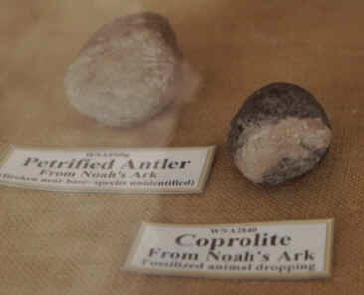
Various Pictures
Crumbling Apart
This photo was taken of the side of the ark. You will find petrified wood and mud matrix material.
This photo was taken of the side of the ark. You will find petrified wood and mud matrix material.
(Left) Perhaps a petrified piece of fruit, or some other object, 3 1/2" diameter, found in the bow of the deck.
(Right) Black seeds? at top of fruit. photos Kevin
Fisher
Google Earth Image of the Ark
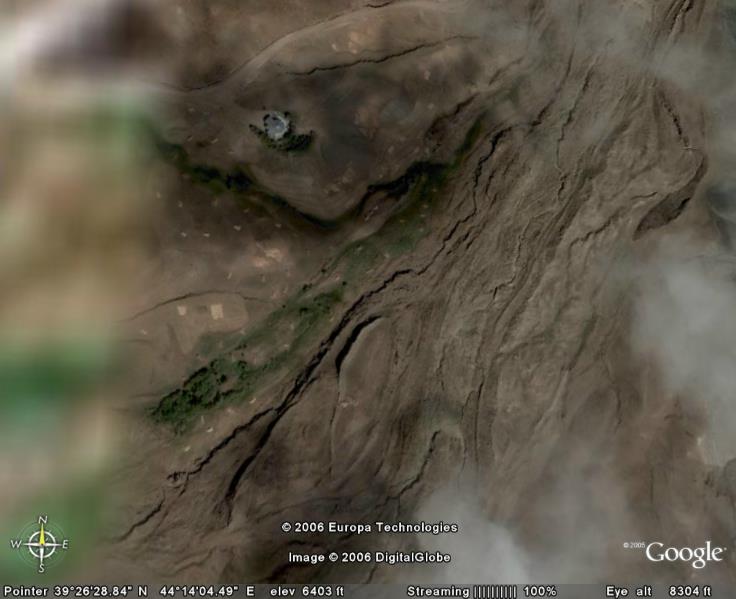
Visitors' Center seen toward top, ark at bottom center.
39 26' 26.09" N and 44 14' 04.29" E
In November 2000, a separate group takes GPS readings to calculate
the length of
the ark
Ostracon or carving on
pottery shard,
depicts man building something,
perhaps Noah.
Found by an archaeologist 60 feet from ark
depicts man building something,
perhaps Noah.
Found by an archaeologist 60 feet from ark
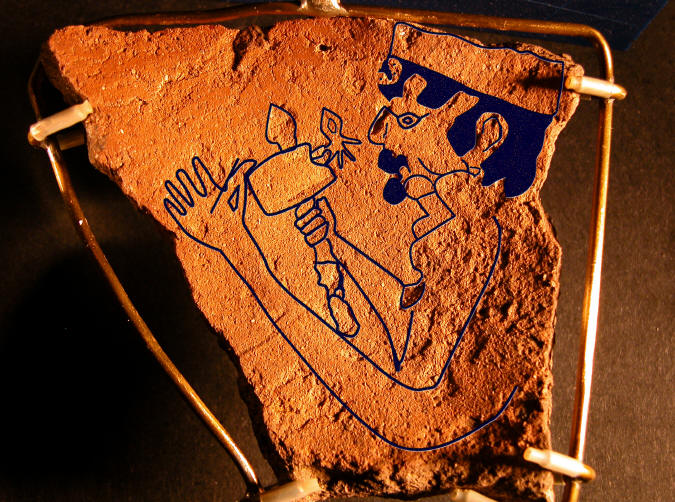
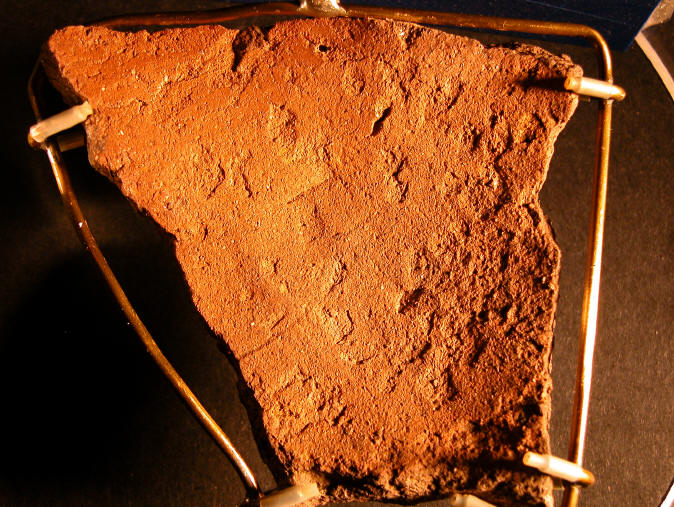
Above: Ostracon image of man hammering
Below: Image of man releasing birds
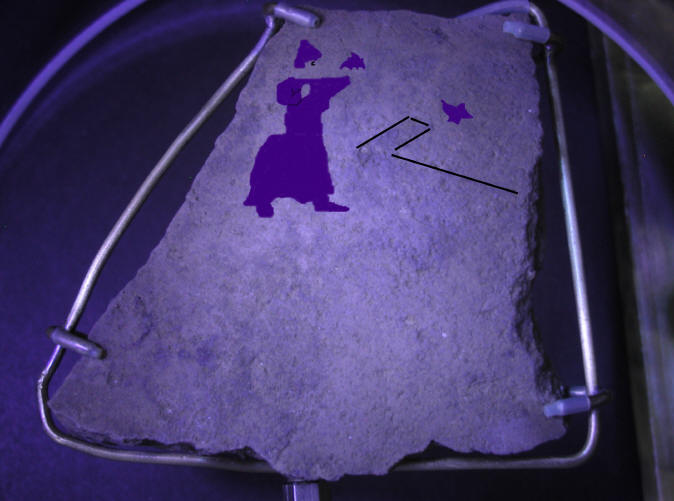
photos Kevin Fisher
Above: Turkish postcard of the Dogubayazit area,
featuring Noah's big boat, on left.
The Village of Eight & the Anchor Stones
Another location where the taxi stalled
Another location where the taxi stalled
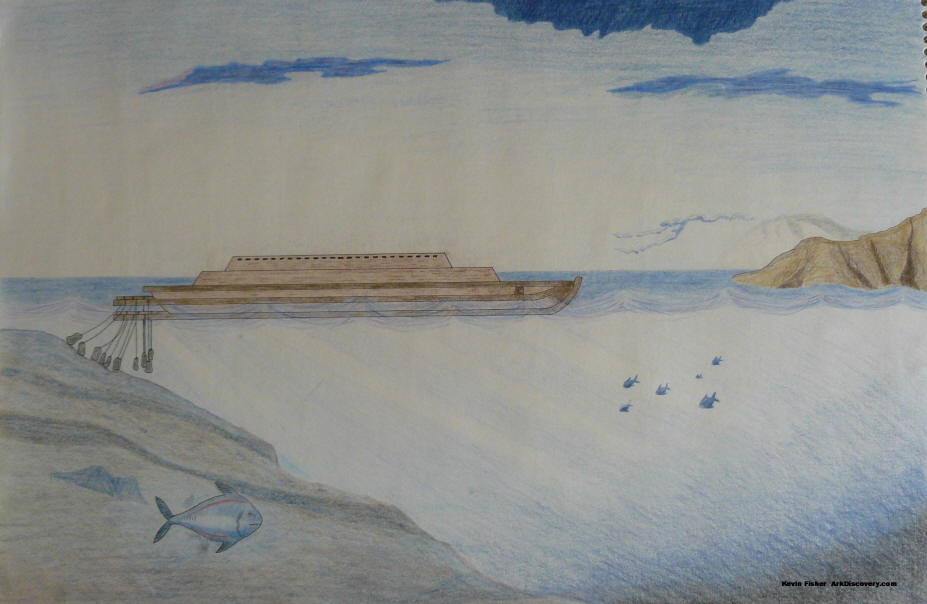
Above: Our drawing of one way the anchor stones would
operate.
What are anchor stones? They hung from ships to
act as additional ballast,
or to help point the bow in a certain direction.
Kevin Fisher stands next to a typical anchor stone found in the Mediterranean area,
much smaller than those which were used on Noah's Ark.
or to help point the bow in a certain direction.
Kevin Fisher stands next to a typical anchor stone found in the Mediterranean area,
much smaller than those which were used on Noah's Ark.
Above: Large anchor stone with Mt. Ararat in distance,
and Dr. Robert Michelson of Georgia Tech
inspecting the stone. The stones were cut off in this area, then the ark floated more freely
to its final landing place about 12 miles away. Dr. Michelson gives a three hour
presentation on the Noah's ark site. photo Kevin Fisher
inspecting the stone. The stones were cut off in this area, then the ark floated more freely
to its final landing place about 12 miles away. Dr. Michelson gives a three hour
presentation on the Noah's ark site. photo Kevin Fisher
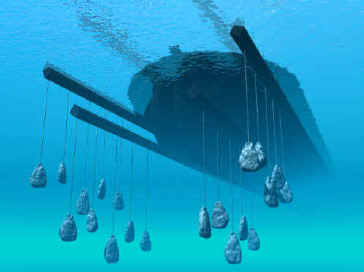
Above: The stones would have been hung from the ark to stabilize it
Above: Broken stone with eight crosses, in the Village
of Eight, named for the eight
survivors of the Flood. The largest cross represents Noah, to the left is a cross for Mrs. Noah,
then three smaller crosses for the sons of Noah, then the three smallest for the wives of the sons. photo Kevin Fisher
survivors of the Flood. The largest cross represents Noah, to the left is a cross for Mrs. Noah,
then three smaller crosses for the sons of Noah, then the three smallest for the wives of the sons. photo Kevin Fisher
Above: The top was broken off by vandals, to the right,
but was laying nearby.
Crosses are carved on this one also.
Crosses are carved on this one also.
Noah's home
Another location where the taxi stalled

Above: Ron Wyatt with a tour group, standing at Noah's
home which overlooks the village
with the anchor stones.
with the anchor stones.
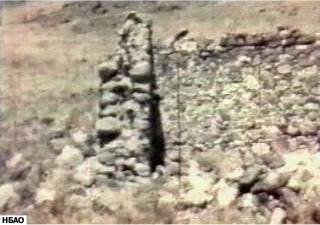
Above: 1977 image of remains of Noah's home. Photo
Ron Wyatt
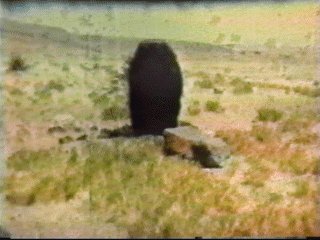
Above: Photo by Ron Wyatt in 1977 of Mrs. Noah's
tombstone in the front yard of this home.
Ron noticed faint inscriptions on the stone.
Ron noticed faint inscriptions on the stone.
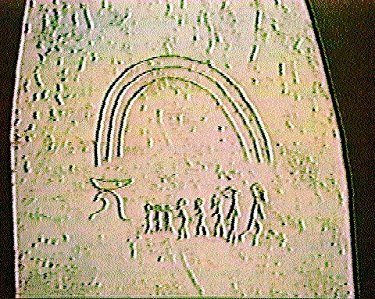
Above: Artist's conception of drawing on tombstone,
showing Mrs. Noah's head turned downward
and her eyes closed, meaning she had died. After Ron showed this to someone, they came back later
and dug up Mrs. Noah's grave, taking her 18 ft. sarcophagus, bones, and jewelry which sold for millions
of dollars on the black market. The locals heard about this and systematically destroyed the house, looking for gold.
and her eyes closed, meaning she had died. After Ron showed this to someone, they came back later
and dug up Mrs. Noah's grave, taking her 18 ft. sarcophagus, bones, and jewelry which sold for millions
of dollars on the black market. The locals heard about this and systematically destroyed the house, looking for gold.
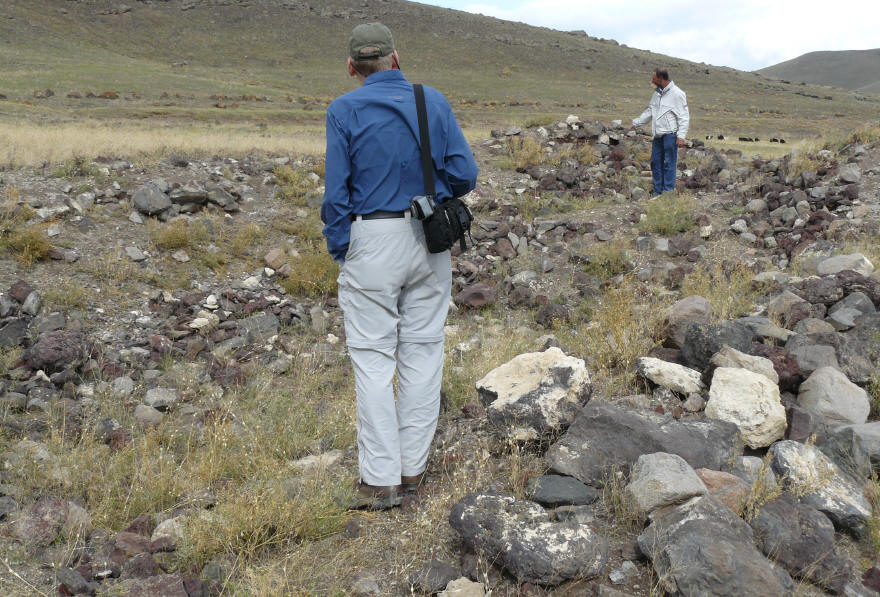
Above: Noah's home today, with its walls torn down by
the locals after they heard that gold was found here.
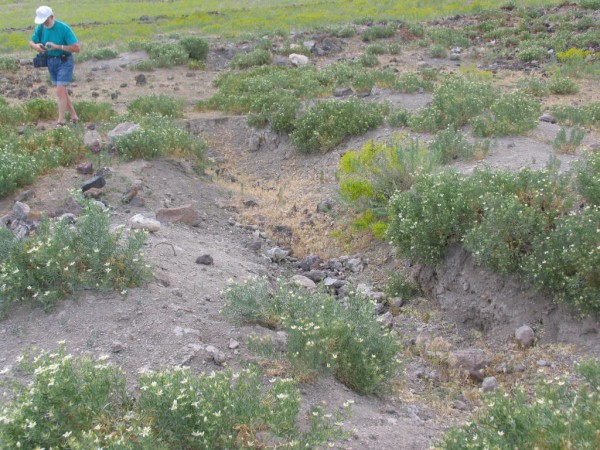
Above: Long grave of Mrs. Noah in the front yard of the
home.
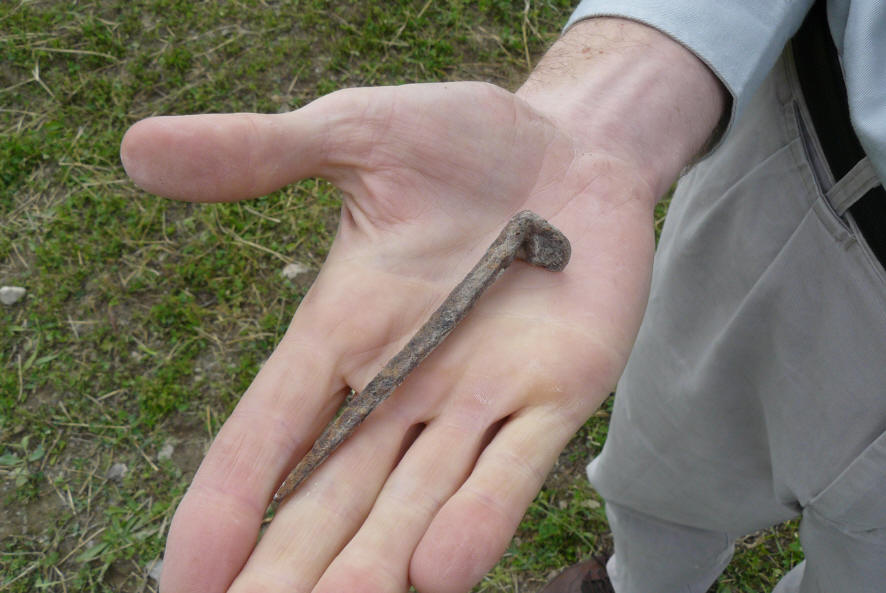
Above: Ross Patterson found this ancient, ribbed nail
next to my shoe while we were standing in Mrs. Noah's empty grave.
Her sarcophagus was stone. This tapered, ribbed nail was designed to secure the lid, and grab tighter and tighter
as is was driven into pre-drilled holes. Testing showed it to be iron metal.
Her sarcophagus was stone. This tapered, ribbed nail was designed to secure the lid, and grab tighter and tighter
as is was driven into pre-drilled holes. Testing showed it to be iron metal.
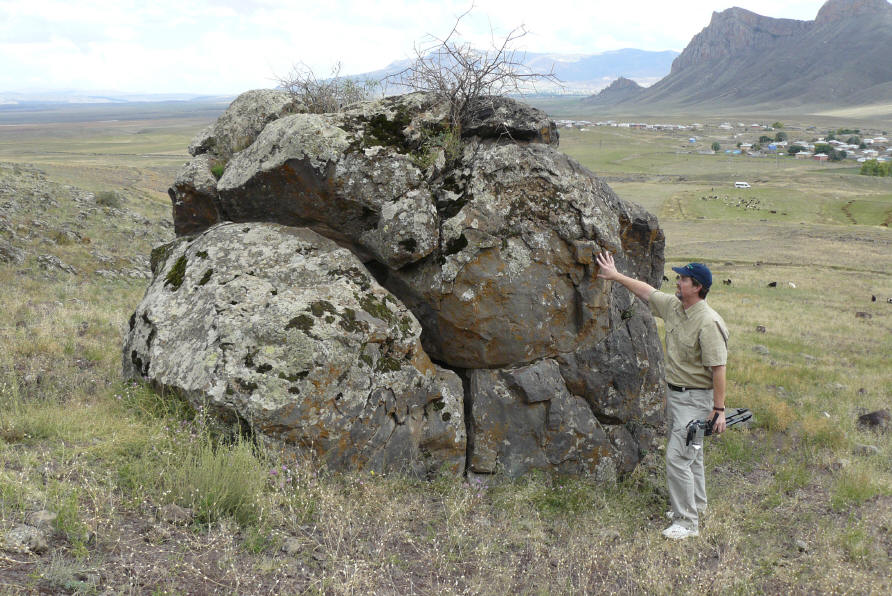
Above: Altar stone behind Noah's home, used for
sacrificing animals. Village with anchor stones in distance.
See More pictures of our trip to the ark:
What's Next?
An excavation permit to dig into the ark has never been issued by the Turkish
government, preventing thorough documentation of the site. Future plans to excavate the ark mandate a building must first
be constructed over the entire 515 ft. long structure, with the entire project
estimated to cost $3-4 million. The money has yet to be raised.
Partial documentation of this site has periodically appeared on The 700 Club,
20/20, The Discovery Channel, The Learning Channel, CNN, Encounters, and various
local Christian TV stations, but Ron Wyatt never had his own documentary
shown on national television.
Ark viewed from rear, pointed front in distance

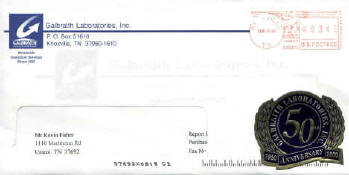
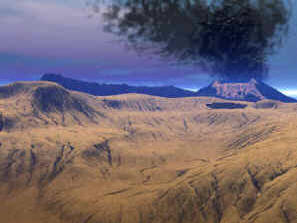

No comments:
Post a Comment